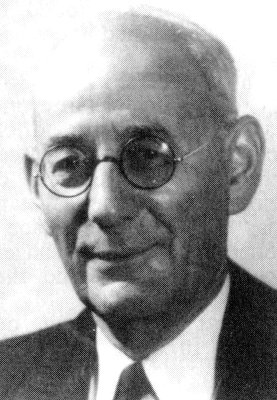Max Jakob
Today, a great engineer escapes the Holocaust. The University of Houston's College of Engineering presents this series about the machines that make our civilization run, and the people whose ingenuity created them.
In 1937, Max Jakob and his family boarded the steamer Berengaria in Cherbourg. They were about to make a stormy six-day crossing to New York. Jakob was leaving his German homeland for good. He limped slightly as he walked up the gangway - the result of a wound on the Russian front in WW-I. He was now 58 years old and a prominent German expert in the field of heat transfer.
Ever since he'd finished his doctorate in Munich, 31 years before, Jakob worked on central questions of the thermal sciences. His life was interwoven with the great minds of those times. His daughter Elizabeth shows us correspondence. Here's a postcard from Einstein, who was born and died the same years as he. Einstein thanks him for setting a critic straight on relativity. A letter from Max Planck thanks Jakob for correcting an error in his paper.
But now he boards a boat to America. Four years before, German troops had gone through Berlin painting the word JEW in large white letters on store windows, and Jakob wrote in his diary,
I never valued my Jewishness as much; but today I'm happy not to be on the side of those who tolerate this.
First, he'd sent his daughter away to college in France. Now he and his wife are also leaving what'd once been the high culture of the Weimar Republic. Four years of NAZI rule have dismantled and burned that world. Now the Jakobs have to flee for their very lives to the land of gangsters and Al Capone - to Chicago whose climate, they'd been told, was murderous. They were each allowed to take $4.00 out of Germany.
Jakob's coming to America was terribly important for us. We were far behind Germany in understanding heat flow, and we were working hard to make up ground. Jakob gave us our first direct conduit to that knowledge. Lucky for everyone that America was not what Jakob had expected. The first photos show him smiling and in-haling the fresh air of a new land.
Once here, he discovered civilization of a new kind, and took pleasure in it. He renewed his youth in the free-wheeling intellectual climate. He joined in, giving every bit as good as he got. Many of the elder statesmen who helped me, as I worked all my life in heat transfer and thermodynamics, were Jakob's students.
An entry turns up in his diary the week before his death in 1955. He'd just been to hear the great Black contralto, Marian Anderson. He was strongly moved by her singing of, and I quote,
the magnificent Negro spirituals, especially 'Nobody Knows the Trouble I've Seen' and 'He's got the Whole World in His Hands.'
And so, with Max Jakob showing the way, heat flow expertise passed to America. By the time he died, he'd become more than just an American educator and an American citizen. For Jakob knew what we sometimes forget. You can't just be handed a better world. He had shared fully in the joyous process of making it so.
I'm John Lienhard, at the University of Houston, where we're interested in the way inventive minds work.
(Theme music)
Jakob, E., Max Jakob: July 20, 1879 - January 4, 1955, Fifty Years of his Work and Life. History of Heat Transfer: Essays in Honor of the 50th Anniversary of the ASME Heat Transfer Division (Edwin T. Layton, Jr. and John H. Lienhard, eds.) New York: ASME 1988, pp. 87-116.
This is a greatly revised version of old Episode 142.
I'm grateful to listener Norman Zelvin for a story that gives an idea of the respect other engineers had for Jakob. Zelvin was a young engineer with the military when Jakob, then on the Board of Advisors, visited his unit.
"I went to the gate to greet him. Since he was obviously handicapped, I offered to carry his bags. Then, he noticed an untied pair of shoelaces and tried to bend down to retie them. I intervened and tied them for him. He asked, 'Why did you do that?' Well, I knew his work well from my college studies. I said, 'In America, we have an expression for greatness. It goes: I wasn't able to hold his hat. You're not wearing a hat, but at least I can say, I tied Dr. Max Jakob's shoelaces."

Max Jakob